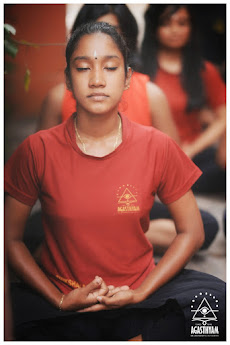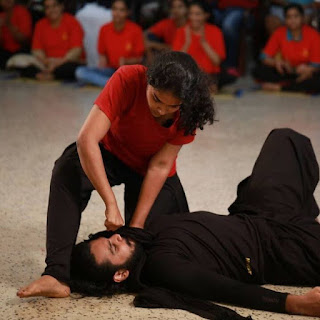Kalaripayattu
Gurukkal Dr. S Mahesh
After three decades of
training, I have come to realize that Kalaripayattu goes beyond
physical exercise—it is a training of the mind. There is a popular
saying in Kalaripayattu that "the body becomes eyes." This
means that regardless of the direction of an attack, practitioners
possess the ability to defend themselves. However, Kalaripayattu
offers more than just defensive skills. It cultivates a sense of
calmness, confidence, and inner peace, which becomes a defining
characteristic of a Kalaripayattu practitioner.
When we examine the
fundamental philosophy of practicing yoga, such as the eight limbs of
Ashtanga Yoga, including yama, niyama, asana, and so on, we
understand that these practices aim to compose and prepare the mind.
Martial arts, similarly, have an immeasurable impact on human
behavior, culture, and personal development. One of the notable
aspects is the development of resilience. Through Kalaripayattu, the
body grows strong and flexible, motor skills improve, reflexes
sharpen, and the mind attains balance. This enables individuals to
face any challenge that life presents, teaching them how to rise
after a fall and confront adversities head-on. Learning how to bounce
back in life when it knocks you down can be considered a culture
unique to Kalaripayattu. Practitioners first learn how to rise after
every fall during training, how to face challenges, overcome pain,
and fight with determination. This is the essence of Kalaripayat
practice.
 |
| Gurukkal Dr. S Mahesh |
Moreover, Kalaripayat enhances
the capacity to endure both mental and physical pain. Often, we fear
pain and shy away from confronting it, which restricts us from
embracing challenges. Many individuals prefer to remain in their
comfort zones, resembling a pupa where they can sit comfortably, but
this limited existence prevents them from fully experiencing the
beauty of life. The mind desires to soar freely like a butterfly, but
this internal struggle holds it back, leading to disappointment and
personal crises. Kalaripayattu liberates individuals from such crises
and empowers them to fly like butterflies—rising after a fall,
transforming pain into adornment, and strengthening the subconscious
mind. Through Kalaripayattu, one can discover limitless possibilities
and transcend self-imposed boundaries.
The conscious mind tends to
dwell either in the past or the future, revealing its limitations. It
is primarily responsible for memory and the imagination of future
events. Unfortunately, this tendency often leads to suffering,
anxiety, and despair. Memories of the past can sometimes become
sources of stress, while worrying about the future adds to our
burdens. It is important to recognize that the conscious mind is just
a small portion, like the tip of an iceberg, compared to the vast
space of the unconscious mind.
Martial arts, in essence,
train the subconscious mind. In threatening situations, the
subconscious mind triggers fight-or-flight responses without our
conscious awareness. It instantly assesses the situation, searching
for survival strategies, such as identifying weapons or escape
routes. The information and memories stored in our subconscious mind,
accumulated since birth, guide these responses. However, the
conscious mind often expresses fear and other emotions. When suddenly
attacked, our fight-or-flight response is driven by the subconscious
mind. This explains why, in extreme circumstances, some individuals
commit violent acts without fully comprehending why they did so. It
is a desperate reaction from the subconscious mind, acting in a
moment of helplessness. These individuals may later regret their
actions.
Martial arts provide training
on how to handle such situations. We repeatedly practice specific
techniques, such as chuvadu or ozhivu, until they become ingrained in
our muscle memory. Through intense and refined practice, these
actions become reflexive responses, deeply embedded in our
subconscious mind. We refer to this phenomenon as muscle memory. When
we repeatedly practice an action, something remarkable happens in our
brain. Neural pathways are created, connecting the neurons
responsible for controlling our body movements. This process reminds
both our mind and muscles of how to respond in a given situation.
While the conscious mind adapts to immediate needs, the subconscious
mind draws upon stored information from the past.
By training the subconscious
mind through martial arts, we can enhance our ability to respond
effectively in challenging situations. This integration of mind and
body allows us to tap into the wisdom and experience stored within
us, providing us with a sense of confidence and readiness.
Through consistent practice,
we can transform motor skills into what we commonly refer to as
muscle memory. However, it is important to understand that our
muscles themselves do not possess the ability to remember specific
movements. Instead, the term "muscle memory" refers to the
coordinated activity of neurons and nerves associated with the
muscles.
Every bodily movement
originates from brain activity. When we engage in repetitive practice
of a particular movement, regardless of its difficulty level, it
activates specific neurons in our brain, creating neural pathways.
These pathways serve as a blueprint for the movement. As a result,
when faced with a similar situation or task, an individual who has
ingrained that movement in their muscle memory will be able to
perform it effortlessly.
The concept of muscle memory
is often misunderstood. It is not a memory stored within the muscles
themselves, but rather a term used to describe the learned motor
skills and the neural connections formed within the brain. It is
through this process that our bodies become capable of executing
complex movements with precision and efficiency.
Activities such as driving a
car, playing the piano, practicing martial arts, or even typing are
primarily executed by our subconscious mind. When we engage in these
tasks, we often find ourselves multitasking, talking, or thinking
about something else while performing them. Remarkably, we can
effortlessly shift gears, press the accelerator, or strike precise
piano keys without conscious effort.
Similarly, martial arts is an
activity that unfolds within the realm of the subconscious mind.
During moments of attack, our reflexes instinctively kick in, often
without our conscious awareness of how they operate. We tend to
comprehend the action only after it has occurred, as our conscious
mind plays catch-up with the swift and automatic responses generated
by our subconscious. It is in these moments that we realize the
profound influence of our subconscious mind in guiding our martial
arts skills and reactions.
Moreover, practicing Kalari
offers numerous benefits. The brain produces neurochemicals like
endorphins, which induce feelings of peace, happiness, confidence,
and a positive attitude. These chemicals contribute to our overall
well-being. Through Kalari practice, we gradually gain control over
our emotions, a state referred to as "bindhu jayam."
Emotional stability is enhanced, and our personality undergoes
positive development. Kalari helps free us from mental blocks,
allowing us to cultivate integrity and a strong sense of self. We
begin to perceive others as equals, develop awareness of the universe
and our place within it, and become individuals capable of providing
a blueprint for others who are struggling to overcome their own
crises.
Furthermore, studies have
proven that Kalaripayattu training can assist individuals in
overcoming past traumas and building strength. It serves as a
powerful remedy to break free from mental barriers and move forward
in life. By practicing martial arts, we unlock our potential for
growth and transformation, both physically and mentally.
During a child's formative
years, particularly until the age of 7, their minds are open and
receptive to the world around them. This period presents a unique
opportunity to shape their behavior, language, and more. It can be
compared to acquiring a new hard disk and selectively copying the
files we desire. Martial arts, such as Kalaripayattu, provide a
platform for repetitive actions, which significantly influence our
subconscious mind. Over time, these actions become ingrained in our
subconscious and contribute to the seamless functioning of our
bodies, often without conscious effort.
The relationship between the
body and the subconscious mind strengthens through reflex actions. We
recognize that the subconscious mind operates akin to a child,
repeating and internalizing what we feed into it. Once engraved,
these impressions persist throughout our lives, shaping our culture
and worldview. Kalaripayattu, being the mother of all martial arts
practices, plays a pivotal role in the holistic development of the
mental, physical, and spiritual aspects of an individual. Disciplined
practice in Kalaripayattu helps prevent the onset of stress and
anxiety, fostering mental strength.
For those who engage in
Kalaripayattu under the guidance of Agasthyam, deep breathing and
mindfulness hold significant importance. These practices enable the
saadhakas, to attain heightened focus and concentration. One can
observe the mind simultaneously maintaining a calm and alert state.
This aligns with the notion of the body becoming the eye, as
mentioned earlier.
Let's envision ourselves
practicing an ozhivu in Kalaripayattu. We find ourselves being
attacked with a sword or another weapon, and we swiftly move away
from the impending strike. This evasion technique is known as ozhivu.
In Kalaripayattu, our training encompasses a combination of striking,
ozhivu, and defense, creating a sequence of movements. When faced
with an attack from a sword, it is crucial to defend ourselves. Have
you ever considered the consequences of not defending against such an
attack? It could result in severe injury or, in the worst-case
scenario, even death.
The practice of ozhivu becomes
ingrained in us, serving as a habitual and effective survival
technique. It enables us to escape the perils of a sharp and
potentially fatal attack. It is vital to recognize that all the
crises we encounter in life are not beyond the ultimate crisis of
death. So, by training in Kalaripayattu, students develop the ability
to confront any challenge with ease. They gain mental strength
through continuous practice.








.png)
.png)

Comments
Post a Comment